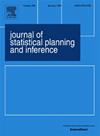利用rsamnyi散度评估稀疏分类的拟合优度
IF 0.8
4区 数学
Q3 STATISTICS & PROBABILITY
引用次数: 0
摘要
我们将r本文章由计算机程序翻译,如有差异,请以英文原文为准。
Assessing goodness-of-fit for sparse categories using Rényi divergence
We present the Rényi divergence as a statistic for assessing goodness-of-fit in sparse frequency tables, where small expected counts can undermine the reliability of the traditional chi-square test. The Rényi divergence with index in (0,1) is a natural choice because it circumvents division-related issues by small frequencies. Our main result demonstrates that the Rényi statistic asymptotically follows a chi-square distribution. Through theoretical insights and Monte Carlo simulations, we evaluate the performance of the Rényi statistic across various values of the divergence index. We find that smaller index values improve the alignment of the Rényi statistic with the chi-square distribution and enhance its performance in sparse data settings. Additionally, the Rényi statistic exhibits good power properties in detecting deviations from the null hypothesis under these conditions. To illustrate its practical applicability, we present two real-world data analyses, highlighting the robustness of the Rényi divergence in scenarios involving sparse categories.
求助全文
通过发布文献求助,成功后即可免费获取论文全文。
去求助
来源期刊
CiteScore
2.10
自引率
11.10%
发文量
78
审稿时长
3-6 weeks
期刊介绍:
The Journal of Statistical Planning and Inference offers itself as a multifaceted and all-inclusive bridge between classical aspects of statistics and probability, and the emerging interdisciplinary aspects that have a potential of revolutionizing the subject. While we maintain our traditional strength in statistical inference, design, classical probability, and large sample methods, we also have a far more inclusive and broadened scope to keep up with the new problems that confront us as statisticians, mathematicians, and scientists.
We publish high quality articles in all branches of statistics, probability, discrete mathematics, machine learning, and bioinformatics. We also especially welcome well written and up to date review articles on fundamental themes of statistics, probability, machine learning, and general biostatistics. Thoughtful letters to the editors, interesting problems in need of a solution, and short notes carrying an element of elegance or beauty are equally welcome.

 求助内容:
求助内容: 应助结果提醒方式:
应助结果提醒方式:


